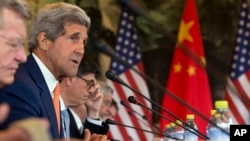The U.S.-China Climate Change Working Group submitted a progress report to the 6th round of the U.S.-China Strategic and Economic Dialogue recently held in Beijing China. Established during Secretary of State John Kerry’s first trip to Beijing in April 2013, the Climate Change Working Group is working to catalyze cooperative efforts by the United States and China to address climate change in key sectors across both economies.
On the progress of the “Five Action Initiatives," the Working Group reported that on the first initiative, “Emission Reductions from Heavy-Duty and Other Vehicles,” the United States and China have agreed to cooperate in three areas: enhanced heavy-duty and other vehicle fuel efficiency standards; clean fuels and vehicle emissions control technologies; and the promotion of efficient, clean freight.
The second initiative is to cooperate on the “integration of smart grid technologies and clean, distributed generation sources into electricity delivery infrastructure.” Smart grids can offer powerful means of reducing or controlling carbon emissions in both countries.
The third initiative is “Carbon Capture, Utilization and Storage.” A few demonstration plants are currently under development in both countries. If the technical, cost, and regulatory barriers to deployment are overcome, it could become an important means to mitigate carbon emissions from coal-fired power plants.
The fourth initiative is “Energy Efficiency in Buildings and Industry,” and the United States and China intend to cooperate on energy savings performance contracting in China; energy efficiency standards and testing; and identifying the top ten energy efficient technologies and best practices for the building industry.
The fifth initiative is to cooperate on building national greenhouse gas emissions reporting systems in both countries. The United States and China plan to hold two capacity-building workshops and one study tour to the United States in 2014-2015 to enhance China’s capacity on greenhouse gas measurement, reporting and verification methodologies.
The U.S. and China also launched a 6th initiative on climate change and forests, adding a significant new sector to U.S.-China climate change cooperation - greenhouse gas emissions from the land sector, which account for one quarter of global emissions.
Recognizing the imperative of negotiating an effective post-2020 climate agreement, and the importance of constructive contributions from both countries to the success of the negotiations, the United States and China have established an enhanced policy dialogue.
On February 14, 2014, the U.S. and China reaffirmed their commitment to contribute significantly to successful 2015 global efforts to meet the challenge of climate change.






